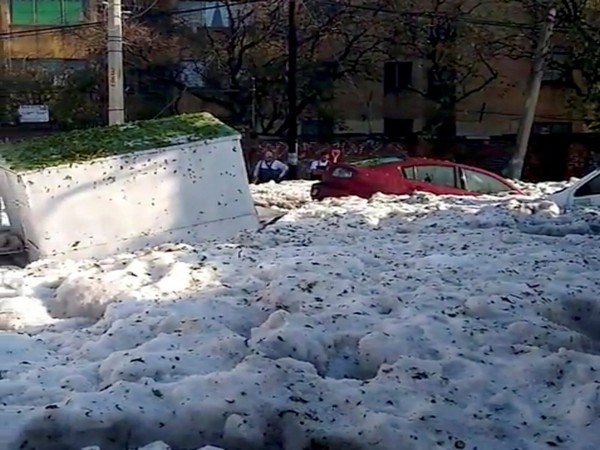The revolutionary partnership of the oppressed
Jun 30, 2020

By Dr Amjad Ayub Mirza
Glasglow [UK], June 30 : The attack on the Karachi Stock Exchange (KSE) on Monday has marked the beginning of a new era in the struggle of the oppressed nations against the colonial rule of the Pakistani military-mullah-feudal alliance that has kept 220 million people subjugated for too long to bear.
Baloch Liberation Army (BLA) claimed responsibility for carrying out the attack that cost the lives of 11 people including a sub-inspector of police, a private guard, and four BLA gunmen. In a press statement emailed to the media, the spokesperson of BLA Jayend Baloch informed that the Majeed brigade of the BLA carried out the attack.
Over the past few years, the Baloch nationalists have become extremely vocal about the atrocities committed by the Pakistani Army and its secret services against those who oppose the China-Pakistan-Economic-Corridor (CPEC).
A silent crackdown against those who demand to be masters of their own natural resources has been going on since the time when Pakistan forcefully annexed Baluchistan in 1948.
Thousands have been reported missing in Baluchistan. According to Voice of Baloch Missing Persons (VBMP), 5,228 Baloch have gone missing between 2001 and 2017 alone. None has ever been produced in front of a court of law.
Security forces also commit atrocities against women in Baluchistan. Rape cells have been established in the region. Women are kidnapped and taken to these cells and raped by the Pakistan Army and even minors are not spared.
A protest camp outside the Quetta Press Club has become a shrine of missing persons where photographs of loved ones are on permanent display. The scribe visited the site a decade ago and met with a few of the members of the families of the missing persons. They told me that no one pays any heed to their grievances and no court has issued any order to produce our missing men.
As lockdown was enforced in Pakistan during the Covid-19 pandemic crisis, schools, colleges, and universities were shut down.
Lack of internet facilities in far-flung remote areas of Pakistan and PoK have led to a build-up of anxiety among the youth. They were asked to continue their academic education online. This anxiety reached an all-time high when it was announced that exams would be conducted in July hence a new form of struggle began to emerge.
It was the peaceful demonstrations held by young students Astore and Skardu in Gilgit-Baltistan, Quetta in Baluchistan, in Islamabad the capital of Pakistan, Lahore the capital of Punjab and the port city of Sindh, Karachi, that gave the political struggle for civil rights a new lease of life.
The brutality with which the state responded to these young teenage students was evident of the nature of the colonial master who demands total subjugation from its subject.
On June 16, the bullet-riddled and tortured body of Jeay Sindh Qaumi Mahaz (Arisar) leader and member of the National Congress of his party Niaz Lashari was found dumped outside Jinnah Hospital in Karachi. Niaz had been missing since April 2018.
The following day the bullet-riddled dead body of Asif Pasha, a senior office-bearer of Muttahida Qaumi Movement, was found dumped on Super-Highway in Karachi. He was in the custody of the security forces since February 2019.
These extrajudicial killings were the tipping point and led to revenge attacks on the Rangers in Sindh by the recently surfaced Sindhudesh Revolutionary Army as riots broke out in several cities and towns in Sindh claiming the lives of at least five Ranger Para-military personal and several of their vehicles set alight.
The state responded with a vengeance and raided houses of those Sindhi nationalists who are actively promoting the cause of the liberation of Sindh from Pakistan. The crackdown continues as I write these lines.
It is in this backdrop that we have to look at the attack on the Karachi Stock Exchange. In his statement issued to the media immediately after the attack BLA spokesperson declared that the attack on Karachi Stock Exchange that had been carried out by the Majeed Brigade had "the full support of the Sindhi nation, which is a reflection of the fraternal ties between the Baloch and the Sindhi nations."
This shows that the BLA and the Sindhudesh Revolutionary Army are heading towards the formation of a united front against Pakistani occupiers. The above proclamation by the BLA spokesperson should be considered nothing short of a death warrant for the military establishment of Pakistan.
If Pashtun Tahafuz Movement (PTM) joins Baloch and Sindhi freedom fighters, and the subjugated people of PoK, Gilgit-Baltistan resort to arms, the game could well be over in less than a year.
The question however is, what would make the Pashtuns and the POJKians to realize that all peaceful means of persuasion are futile.
It is in this context that a movement for civil disobedience must be initiated in the above-mentioned docile parts of Pakistan. Well, as far as Gilgit-Baltistan is concerned the government has just announced August 18 to be the date when a general election in the occupied territory will be held.
The time to call for a boycott of these elections could be a positive sign that would be helpful in making the oppressed people realize that if during the past 70 odd years elections could not bring them freedom and ownership rights of their land then how could these elections, which are being conducted with the barrel of a gun pointed at them could possibly bring any change.
Pakistan is breaking apart. The attack on Karachi Stock Exchange will mark a turning point in the struggle for freedom of the colonial subjects of Pakistan.
However, the revolutionary partnership among the oppressed nations is the only weapon that brings down the so-called Islamic republic and will kill the beast called Pakistan.
[Disclaimer: Amjad Ayub Mirza is an author from Mirpur in PoK. He currently lives in exile in the United Kingdom]


















